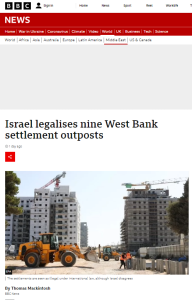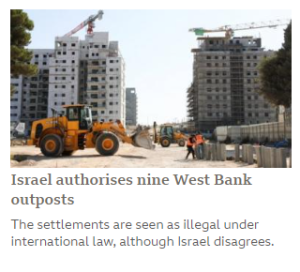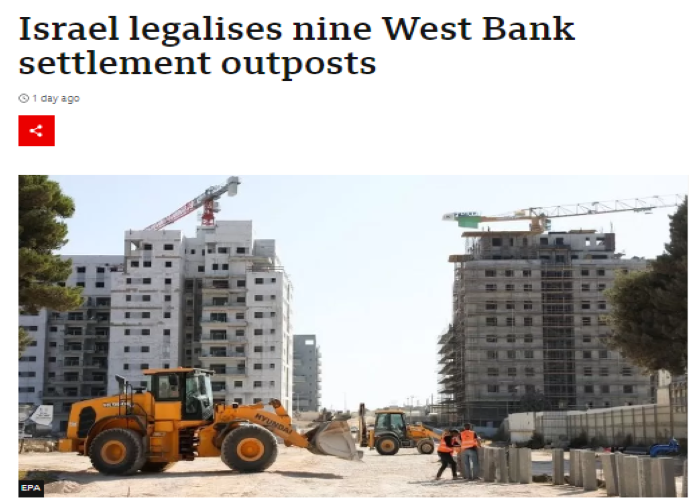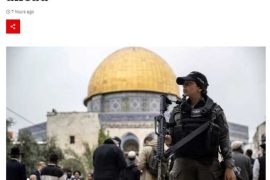On the morning of February 13th the BBC News website published a report by Thomas Mackintosh on its ‘Middle East’ page.
The headline of that report reads “Israel legalises nine West Bank settlement outposts” and its opening paragraph tells readers that:
“The Israeli government has authorised nine Jewish settlements in the West Bank which were previously unauthorised outposts.”
BBC audiences around the world could therefore be forgiven for understanding that the legalisation of those nine outposts is already a done deal.
However, as explained at the Times of Israel, the cabinet decision taken on February 12th is an initial step a process:
“The cabinet on Sunday approved the legalization of nine outposts deep in the West Bank in response to a string of recent Palestinian terror attacks in East Jerusalem.
Prime Minister Benjamin Netanyahu announced the decision in a statement, listing the illegal outposts as Avigayil, Beit Hogla, Givat Harel, Givat Arnon, Mitzpe Yehuda, Malachei Hashalom, Asahel, Sde Boaz and Shacharit.
To legalize the outposts, the government will have to prove that they were established on what Israel considers to be state land. This will likely be difficult given that many of them, including almost all of Sde Boaz and Givat Harel, were built on private Palestinian land.
The High Court of Justice is likely to object to such legalizations and the process will often take months, if not years.”
Clearly Mackintosh’s portrayal does not provide BBC audiences with the full and accurate picture.
Additionally, Mackintosh tells readers that:
“Also on Sunday, Israeli authorities announced mass construction of new homes within established settlements.
A statement from Mr Netanyahu’s office said a planning committee would convene in the coming days to approve new settlement homes.”
It is the planning committee that is a branch of the Defence ministry’s Civil Administration which approves building in Area C, meaning that Mackintosh’s claim that “mass construction” had already been announced by “Israeli authorities” is also premature. The Times of Israel reported that part of the story as follows:
“Netanyahu also said that his cabinet members agreed to have the Defense Ministry body responsible for authorizing settlement construction convene in the coming days to advance plans for new Israeli construction in the West Bank.”
Mackintosh did not however forget to promote the standard yet partial BBC mantra concerning ‘settlements’ and ‘international law’:
“The international community regards all settlements as illegal under international law, though Israel disputes this.
Palestinians see settlements as a major obstacle to a peace deal with Israel.
They want all settlements and outposts to be removed from the West Bank and East Jerusalem, which they seek for a future Palestinian state.
Israel has built about 140 settlements housing some 600,000 Jews since it occupied West Bank and East Jerusalem in the 1967 Middle East war.”
That partial messaging was repeated in the caption to the image illustrating the report (which was taken in Beit El rather than an outpost) and in the sub-heading presented on the ‘Middle East’ page.
As is almost always the case in BBC reporting, readers were told nothing about alternative legal views on that topic or the related issue of Jordan’s illegal invasion and 19-year occupation of the territory concerned, with the result being that the BBC actively avoids providing the “range and depth of analysis” essential for audiences to make up their own minds as “informed citizens”.






No-one should expect the BBC to publish any report on anything Israeli that is properly researched. It will simply take any Israeli action, omit the circumstances that prove Israel is acting correctly, and spout another slagging-off of the nation state.